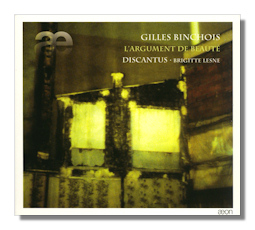
The Internet's Premier Classical Music Source
Related Links
- Binchois Reviews
- Latest Reviews
- More Reviews
-
By Composer
-
Collections
DVD & Blu-ray
Books
Concert Reviews
Articles/Interviews
Software
Audio
Search Amazon
Recommended Links
Site News
 CD Review
CD Review
Gilles Binchois

L'Argument de Beauté
- Antiphon "Ave corpus Christi carum" for 3 Voices, K. 31 (contrafactum of rondeau "Adieu mes tres bell")
- Kyrie "in simplici die," for 3 Voices, K. 14
- Gloria for 3 Voices, K. 16
- Sanctus for 3 Voices, K. 20
- Agnus Dei for 4 Voices, K. 21
- Antiphon "Salve Sancta parens (i)" for 3 Voices, K. 46a
- Antiphon "Da pacem Domine" for 3 Voices, K. 34
- Hymn "Virgo rosa venustatis" for 3 Voices, K. 52 (contrafactum of rondeau "C'est assez")
- Hymn "Ut queant laxis" for 3 Voices, K. 49
- Hymn "A solis ortu cardine" for 3 Voices, K. 28
- Responsory "Deo gracias" for 3 Voices, K. 35
- Anonymous C15th:
- Omnes una Gaudeamus
- Diffusa est gratia, offeratory
- Ecce quod natura, noël
- Salvator mundi, antiphon in mode VII (Liber Usualis #747)
- Salve sancta parens, no'l
- Misit dominus, gradual
- Inter natos mulierum, alleluia
- Princeps gloriosissime
- Gaude dei genitrix, sequence
Discantus Ensemble/Brigitte Lesne
Æon ÆCD1096
This is a beautifully-performed CD of sacred polyphonic chants and carols from fifteenth century Burgundy. It mixes gorgeous yet transparently spare items by the Burgundian court composer Gilles de Bins (c.1400-1460) known as Binchois and contemporary plainchant in almost equal measure. There is just under an hour of music at times tastefully accompanied with handbells from the specialist group Discantus, which was founded in the early 1990s in the same region in which these works originate and is led by vocalist, instrumentalist and director Brigitte Lesne. This is highly evocative, full of atmosphere and quietly persuasive and can be recommended to anyone who enjoys this repertoire.
Binchois is better known for his lyrical secular œvre. Here is a representative and appetite-whetting set of his sacred output. It has the same élan, joie de vivre and delicacy without preciousness as do his better known compositions. The composer is unusual for his time in that no complete mass cycle survives, and only one isorhythmic motet, is extant. The writing also favors a three voice (superius, contratenor, tenor) rather than four voice texture. In some ways this in itself doesn't matter too much. The melodic writing, thinner than that of some of his contemporaries, is what we listen to over the texture. At other times, a cooler, more liquid and less tightly-woven timbre throws the emphasis back on the words; this has many advantages.
Of course, it's unlikely that women's voices would have been heard in the chapels and cathedrals of Binchois' time. Somehow, the style and utterly peaceful, elegant and confident delivery of Discantus sweeps away any such objections: theirs is a singing of great immediacy without forcing any one aspect of the music on us. Except perhaps implicitly commending to us its sheer limpid beauty. In fact the CD's title comes from the idea that in some musica ficta the argument for accidentals has often been one of necessity; in other cases such accidentals are there just for the sake of (their) sheer beauty. These accidentals were not, of course, always notated as such, much being left to the performer(s). The members of Discantus are particularly adept at making the most of the latitude which Binchois envisaged – largely because of their sensitivity and command of the idiom of the fifteenth century.
So we can be sure that an important element of this performance is indeed its spontaneity. For all its serenity and precision, Discantus makes the music sound very alive, very immediate and full of life. The chant is less sinuous than might be the case in (oddly enough, perhaps) more rigid hands. These singers are actually almost more reserved. But in a way that encourages the listener to concentrate back in on the music itself, rather than on the act of their performing it. In fact the slow and gentile pace at which the singers take all the music on the disk is one of its distinctions. The singers of Discantus seem as though they've always known this music very well; they sense just where to hold back, where to pace forward, where to ornament and where to merely "stand and point".
The order of Binchois's pieces interleaved with the plainchant works well too. As do the moments with handbells. L'Argument de Beauté in no way attempts to recreate or simulate a known event from the period, a performance or even any style of worship. Again, this matters not a bit. Discantus are out to have us love the music first, not any aspects of their presentation of it. They succeed. Perhaps their attachment to the devotional aspect of the courtly confers upon the latter an almost heavenly quality that adds depth as well as joy. It's certainly music to savor and respect in equal measure thanks to these suave musicians' expertise and spontaneity.
The acoustic on this recording, which was made in the Eglise évangélique allemande in Paris, is resonant without carrying too much reverberation. It's ideal. The nine members of Discantus make the most of its calm, realistic and almost sensual yet relatively dry atmosphere. The documentation that comes with the CD is clear and informative with ample detail on all aspects of the music and performers. There is not enough music by Binchois on record. Certainly next to none of what's offered here. So this CD will be of lasting appeal to lovers of vocal music of the French early Renaissance, and in fact to anyone who wants idiomatic presentation of wonderful vocal music performed sensitively and persuasively by experts.
Copyright © 2011, Mark Sealey.





















